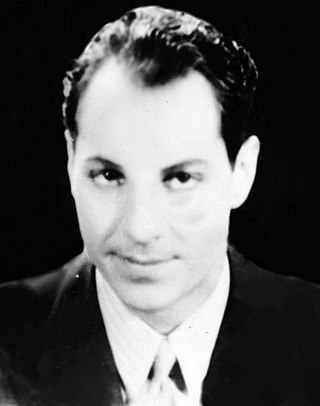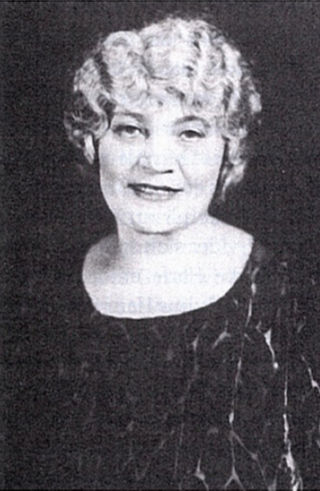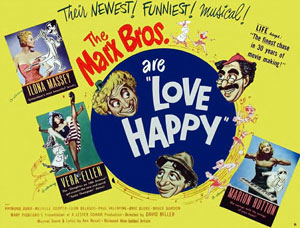
Julius Henry "Groucho" Marx was an American comedian, actor, writer, and singer who performed in film, television, radio, stage, and vaudeville. He is generally considered to have been a master of quick wit and one of America's greatest comedians.

The Marx Brothers was an American family comedy act that was successful in vaudeville, on Broadway, and in 14 motion pictures from 1905 to 1949. Five of the Marx Brothers' fourteen feature films were selected by the American Film Institute (AFI) as among the top 100 comedy films, with two of them, Duck Soup (1933) and A Night at the Opera (1935), in the top fifteen. They are widely considered by critics, scholars and fans to be among the greatest and most influential comedians of the 20th century. The brothers were included in AFI's 100 Years... 100 Stars list of the 25 greatest male stars of Classical Hollywood cinema, the only performers to be included collectively.

Animal Crackers is a 1930 American pre-Code Marx Brothers comedy film directed by Victor Heerman. The film stars the Marx Brothers,, with Lillian Roth and Margaret Dumont. It was based on their Broadway musical of the same name, in which mayhem and zaniness ensue when a valuable painting goes missing during a party in honor of famed African explorer Captain Jeffrey T. Spaulding. A critical and commercial success upon its initial release, it was filmed at Paramount's Astoria Studios in Astoria, Queens; it was the second of two films the Brothers would make in New York City.

Duck Soup is a 1933 American pre-Code musical black comedy film written by Bert Kalmar and Harry Ruby, with additional dialogue by Arthur Sheekman and Nat Perrin, directed by Leo McCarey. Released by Paramount Pictures on November 17, 1933, it starred the Marx Brothers and also featured Margaret Dumont, Louis Calhern, Raquel Torres and Edgar Kennedy. Duck Soup was the last of five Marx Brothers films released by Paramount Pictures. Groucho portrays the newly installed president of the mythical country of Freedonia. Zeppo is his secretary, while Chico and Harpo are spies for the neighboring country of Sylvania. Relations between Groucho and the Sylvanian ambassador deteriorate during the film, and they go to war at the conclusion.

A Night at the Opera is a 1935 American comedy film starring the Marx Brothers, and featuring Kitty Carlisle, Allan Jones, Margaret Dumont, Sig Ruman, and Walter Woolf King. It was the first of five films the Marx Brothers made under contract for Metro-Goldwyn-Mayer after their departure from Paramount Pictures, and the first after Zeppo left the act. The film was written by George S. Kaufman and Morrie Ryskind from a story by James Kevin McGuinness, with additional uncredited dialogue by Al Boasberg. The film was directed by Sam Wood.

Arthur "Harpo" Marx was an American comedian, actor, mime artist, and harpist, and the second-oldest of the Marx Brothers. In contrast to the mainly verbal comedy of his brothers Groucho and Chico, Harpo's comic style was visual, being an example of vaudeville, clown and pantomime traditions. He wore a curly reddish blond wig and was silent in all his movie appearances, instead blowing a horn or whistling to communicate. Marx frequently employed props such as a horn cane constructed from a lead pipe, tape, and a bulbhorn.

Leonard Joseph "Chico" Marx was an American comedian, actor and pianist. He was the oldest brother in the Marx Brothers comedy troupe, alongside his brothers Arthur ("Harpo"), Julius ("Groucho"), Milton ("Gummo") and Herbert ("Zeppo"). His persona in the act was that of a charming, uneducated but crafty con artist, seemingly of rural Italian origin, who wore shabby clothes and sported a curly-haired wig and Tyrolean hat. On screen, Chico is often in alliance with Harpo, usually as partners in crime, and is also frequently seen trying to con or outfox Groucho. Leonard was the oldest of the Marx Brothers to live past early childhood, the first-born being Manfred Marx who had died in infancy. In addition to his work as a performer, he played an important role in the management and development of the act in its early years.

Herbert Manfred "Zeppo" Marx was an American comedic actor, theatrical agent and engineer. He was the youngest and last survivor of the five Marx Brothers. He appeared in the first five Marx Brothers feature films from 1929 to 1933, and then left the act for careers as an engineer and theatrical agent.

Margaret Dumont was an American stage and film actress. She is best remembered as the comic foil to the Marx Brothers in seven of their films; Groucho Marx called her "practically the fifth Marx brother."

Susan Alva Fleming was an American actress and the wife of comic actor Harpo Marx and sister in law to Groucho, Chico, Zeppo and Gummo. Fleming was known as the "Girl with the Million Dollar Legs" for a role she played in the W. C. Fields film Million Dollar Legs (1932). Her big stage break, which led to her Hollywood career, was as a Ziegfeld girl, performing in Rio Rita.

A Day at the Races is a 1937 American comedy film, and the seventh film starring the Marx Brothers, with Allan Jones, Maureen O'Sullivan and Margaret Dumont. Like their previous Metro-Goldwyn-Mayer feature A Night at the Opera, this film was a major hit.

Minnie Marx was the mother and manager of the Marx Brothers, a family of vaudevillains, Broadway and film actors and was also the sister of comedian and vaudeville star Al Shean.

The Cocoanuts is a 1929 pre-Code musical comedy film starring the Marx Brothers. Produced for Paramount Pictures by Walter Wanger, who is not credited, the film also stars Mary Eaton, Oscar Shaw, Margaret Dumont and Kay Francis. It was the first sound film to credit more than one director, and was adapted to the screen by Morrie Ryskind from the George S. Kaufman Broadway musical play. Five of the film's tunes were composed by Irving Berlin, including "When My Dreams Come True", sung by Oscar Shaw and Mary Eaton.

Monkey Business is a 1931 American pre-Code comedy film. It is the third of the Marx Brothers' released movies, and the first with an original screenplay rather than an adaptation of one of their Broadway shows. The film also features Thelma Todd, Harry Woods and Ruth Hall. It is directed by Norman Z. McLeod with screenplay by S. J. Perelman and Will B. Johnstone. Much of the story takes place on an ocean liner crossing the Atlantic Ocean.

Love Happy is a 1949 American musical comedy film, released by United Artists, directed by David Miller and starring the Marx Brothers in their 13th and final feature film, as well as a memorable walk-on by a relatively unknown Marilyn Monroe.

The Big Store is a 1941 American comedy film starring the Marx Brothers that takes place in a large department store. Groucho appears as private detective Wolf J. Flywheel.
Arthur Sheekman was an American theater and movie critic, columnist, playwright, and editor—but best known for his writing for the screen. His specialty was light comedy. Groucho Marx called him "The Fastest Wit in the West."

I'll Say She Is (1924) is a musical comedy revue written by brothers Will B. Johnstone and Tom Johnstone (music). It was the Broadway debut of the Marx Brothers. The initial production premiered in June 1923 at Walnut Street Theatre in Philadelphia, PA before its national tour. A revival of I'll Say She Is, as "adapted and expanded" by the writer-performer Noah Diamond, was seen Off Broadway at the Connelly Theater in 2016.
Groucho: A Life in Revue is a stage play written by Groucho Marx's son Arthur Marx and Robert Fisher. With musical direction by Jim Grady. It is a look at the life and career of the famous entertainer Groucho Marx of the Marx Brothers and You Bet Your Life fame. It opened off-Broadway at the Lucille Lortel Theatre on October 8, 1986, and played 254 performances closing on May 3, 1987. It starred 23-year-old actor Frank Ferrante as Groucho Marx from age 15 to 85, Les Marsden as Harpo Marx and Chico Marx, Faith Prince as The Girls and Rusty Magee as The Citizen of Freedonia. The revue was produced by Nancy and Ronnie Horowitz, and directed by Arthur Marx.

Samuel Marx was the father of the American entertainers known as the Marx Brothers, stars of vaudeville, Broadway and film, and the husband of Minnie Marx, who served as the group's manager.



















